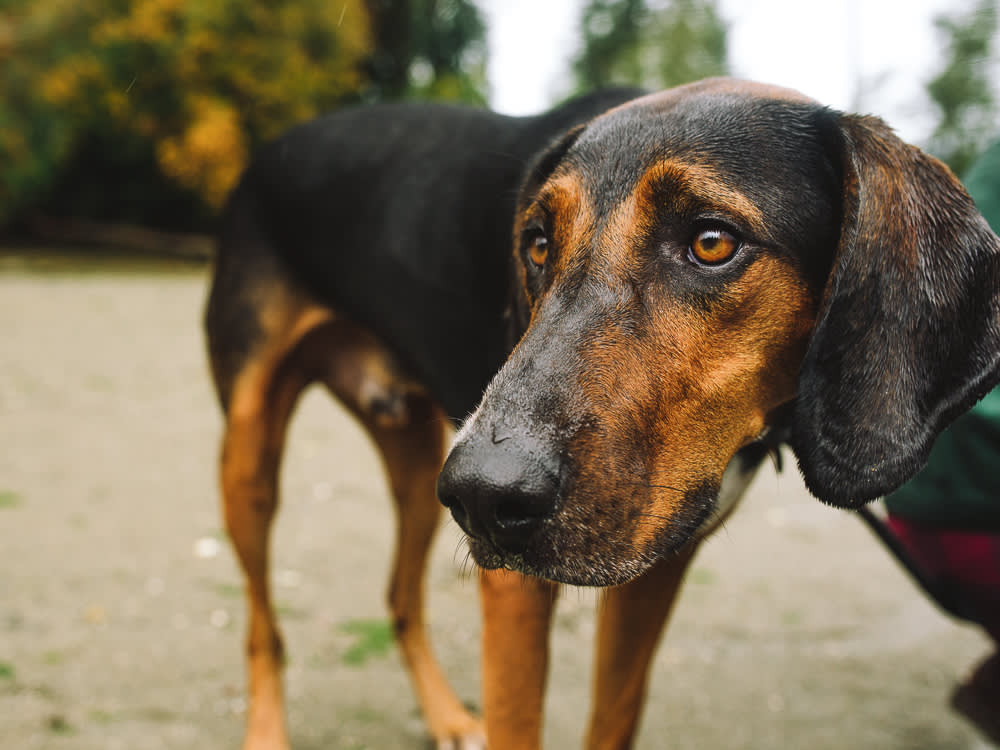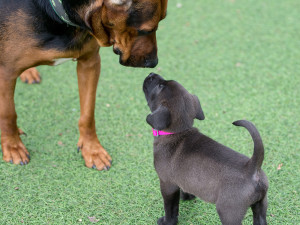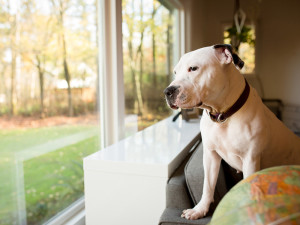Helping Our Newly Adopted Country Dog Adjust to NYC Was Easy(ish)
From a Tennessee farm to a Brooklyn apartment, our rescued Hound dog is going with the flow — mostly.

Share Article
Pandemic pets have proven to be the silver lining of an otherwise bleak couple of years. During a time of uncertainty, fear, and downright depressing news — and when you have every excuse not to leave home — the one bright side is having a snuggly best friend.
A pandemic pup was never in the cards for me, though, because I already had two pets: Montie, a spunky elderly Terrier mix I adopted a decade ago, and Tiger, a supremely chill rescue cat that my husband had welcomed into his life prior to meeting me. Before moving in together, we had spent years and an embarrassing amount of money on a dog trainer, who worked with Montie on controlling her Terrier instincts enough to peacefully coexist with a cat. And at long last, everyone was getting along great in our Brooklyn apartment.
We had done our fair share of fostering over the last few years, temporarily toying with the what ifs? of another dog. In the end, we always came to the same realization: It was fun, but it just wasn’t practical. But then COVID happened. And like the pandemic had irrevocably altered everything else in our lives over the last year, it also changed our minds about adding another dog to the mix.
During an extended visit to Tennessee over the summer, I downloaded PetFinder. Was it a practical decision? Nope. But life is short, and there was something about being in a new location with a backyard that allowed me to convince myself that a second dog was doable. Turns out, pandemic puppies were much easier to come by in Tennessee than in New York, where demand early in the pandemic had caused shelters to run out of adoptable dogs.

My husband and I fell in love with an adorable black-and-brown Hound named Hopper immediately. He was being fostered by a local family, and he was big — about 60 lbs. — and much larger than Montie. We introduced them at a local dog park, and when the dogs seemed to get along, we decided to take in Hopper as a foster. That way, we had an out. If it didn’t work, or if he didn’t end up getting along with our pets, the shelter reassured us that he would go back to his original foster family.
It became clear that Hopper got along great with pretty much all living things: dogs, cats, people, even the wild turkeys that wandered over from the farm across the street. He took to our cat, Tiger, especially, cuddling with him on the bed and playfully licking his face. We felt really good about things and committed to adopting him as a permanent member of our family. Hopper was setting in so easily to life in Tennessee. We only hoped the same would be true when we headed back to Brooklyn.
We spent the 15-hour drive back to New York contemplating every worst-case scenario: What if Hopper freaked out over all the city traffic? What if he barked constantly and annoyed our neighbors? What if his separation anxiety — which we were still working through — got worse? And finally, the most New York of New York problems: What if a 60 lb. dog was simply too big for our apartment?
Once we got home, we were grateful to learn that Hopper didn’t mind the honking cars or the people one bit. He loved our neighbors and made lots of fast friends at the dog park. Since we take him to the dog park nearly every morning, he passes out on the couch for the rest of the day — and because of this, our apartment doesn’t even feel that small.
There are some issues, of course. Like many pandemic pups, Hopper has separation anxiety. He’s also a little leash reactive and barks when strangers come to the door. And as we work with him on these things, it’s been helpful to give our neighbors a heads up about our new dog and any behavioral quirks. That way, they’re more likely to understand if any behavioral problems do come up.
Another thing we did immediately was enlist a professional dog trainer. Booking a session with a dog trainer has helped Hopper acclimate to his new life while simultaneously working through his leash reactivity. We also secured a regular dog walker, knowing it can take a while to find a trustworthy walker.
Adopting a second dog has required a lifestyle adjustment and some extra preparation for our post-COVID routines. While there have been setbacks, small progress is still progress. Taking things one step at a time while we are all still (mostly) at home means that as we re-enter the world, our dog feels equipped, too.

Liza Darwin
Liza Darwin is a writer and brand strategist. She has contributed to NYLON, Refinery29, Vogue, The Guardian, Vice, and Elle, and co-founded the news platform Clover Letter. She lives in Brooklyn with her two dogs, Montie and Hopper, and cat, Tiger.


